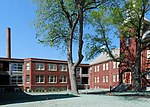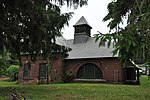Otis Cary House
Birthplaces of individual peopleBuildings and structures in Foxborough, MassachusettsGreek Revival houses in MassachusettsHouses completed in 1837Houses on the National Register of Historic Places in Norfolk County, Massachusetts ... and 1 more
Norfolk County, Massachusetts Registered Historic Place stubs

The Otis Cary House is a historic house in Foxboro, Massachusetts. It is a 2+1⁄2-story wood-frame house, five bays wide, with a side-gable roof, twin end chimneys, and a central entrance with flanking sidelights. It was built in 1837 by Otis Cary, a leading businessman and politician in the town. Cary owned the foundry on Mill Street, and was active in town and state politics. Cary's grandson, the noted educator Frank Boyden, was born in this house.The house was listed on the National Register of Historic Places in 1986. It is now home to Bright Start Child Care.
Excerpt from the Wikipedia article Otis Cary House (License: CC BY-SA 3.0, Authors, Images).Otis Cary House
South Street,
Geographical coordinates (GPS) Address Nearby Places Show on map
Geographical coordinates (GPS)
| Latitude | Longitude |
|---|---|
| N 42.045 ° | E -71.26 ° |
Address
South Street 250
02035
Massachusetts, United States
Open on Google Maps










